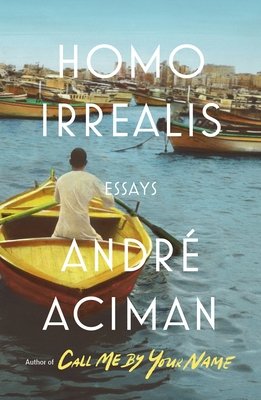
27 Jun Book Review of Homo Irrealis: Essays
A Journey Through the Irrealis: Reflecting on André Aciman’s Homo Irrealis: Essays
From the moment I heard about André Aciman’s latest collection, Homo Irrealis: Essays, I felt that familiar thrill—the one that sparks when a beloved author unveils their thoughts in a new form. Aciman, known for the poignant masterpiece Call Me By Your Name, has a unique ability to tap into the depths of human longing and memory. However, I was curious to see how he would navigate the more cerebral territory of essay writing. This collection, as I soon discovered, is both a challenging and rewarding excursion into the intricacies of identity, desire, and the irretrievable nature of human experience.
At the heart of Homo Irrealis lies the concept of "irrealis," a linguistic term that Aciman deftly employs to explore the space between what is and what isn’t, threading together a tapestry of past, present, and potential selves. His own "many worlds" immigrant experience shapes this collection; threads of memory intertwine with unfulfilled longings, painting a portrait of a man caught in the flux of becoming. For example, Aciman’s candid exploration in “In Freud’s Shadow, Part 2” invites us into his world as a schoolboy in Rome, where his habitual visits to a large bookstore lead to encounters that are equal parts exhilarating and haunting. The recollections of a nearly erotic bus ride—with a young man pressed against him—captured my attention completely. It’s a moment rich with unresolved desire, underscored by a yearning to revisit the past, which is poignantly encapsulated in his commitment to ride that bus again.
Aciman’s writing style is both fluid and contemplative, engaged in a dance between the analytical and the intimate. He manages to strike a balance between exploring complex psychological theories and delving into deeply personal anecdotes. This contrast is evident in passages filled with beautifully crafted prose, such as when he describes the Apollo Sauroktonos statue, which he embraces as both an emblem of chastity and a reminder of his own erasures and yearnings. It’s in these moments that Aciman truly shines, revealing the vulnerabilities that underpin our desires for connection and understanding.
What makes this collection particularly compelling is how Aciman playfully questions notions of desire and morality. Critics may argue about the age dynamics seen in his fiction, yet Aciman probes deeper—digging into societal perceptions and personal truths. “Is this a surefire indication of pathology, or just wishful thinking on the part of cancel culture?” he asks, reminding us that our interpretations are often colored by our experiences and expectations.
As I moved through the essays, I found myself wrestling with my emotions and thoughts about desire, art, and the many selves that we carry within us. Aciman invites his readers into this rich tapestry, asking us to reflect on our own lives and the “irrealis” moments that linger in our memories.
If you’re drawn to reflective essays that explore the human condition through the lens of both intellect and vulnerability, I wholeheartedly recommend Homo Irrealis. It’s a collection that could resonate deeply with fans of Aciman’s novels and those who appreciate the delicate interplay of experience and imagination. Reading it left me with a resonant sense of connection to the threads of longing that unite us all—a reminder that even the most ephemeral moments can shape the contours of our lives.









